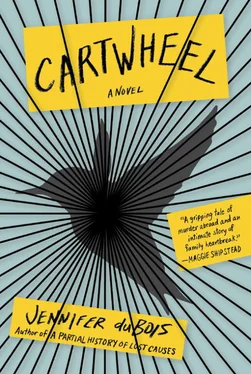He went to the kitchen and turned on the coffeepot. It hissed and sputtered like a roused animal, and he hoped Maria could hear it. He padded back into the office and opened the window. Outside, it was raining an invisible nocturnal rain. He sat back down and put his cheek to the table. He stared at the photograph of Lily Hayes. Her prosecution was something that was owed to her—just as much as, if not more than, it was owed to Katy Kellers. In his head, Eduardo spoke to Lily: We must act as though our understanding, as limited as it might be, is the most panoramic and complete understanding possible. We must act as though everything in this life counts; as though we have only one shot to get things right. We must act as though nobody would see the truth if we did not see the truth .
He would tell Maria some of these things someday, he thought.
Eduardo opened his eyes. Outside, somehow, the sky was already, relentlessly, brightening to the color of tallow. The rain had stopped. It was possible that Eduardo had slept.
March
It was ten days before Sebastien finally saw Beatriz Carrizo again.
He’d been staring at the computer for nearly an hour, trying to decide whether to buy lightbulbs online. Leaving the house was beginning to feel impossible. The women at Pan y Vino went silent now whenever Sebastien came in—though whether from hostility or sympathy or politeness (since, like everyone else, they were doubtlessly spending most of their waking hours talking about the trial), he did not know. But whatever the case, Sebastien’s going anywhere or doing anything had come to seem like an elaborate imposition on everybody else, when before it had seemed like an imposition only on Sebastien himself. He certainly hadn’t been in the market for yet another reason to stay indoors. And he found that there was something strangely anxiety producing about not being able to leave the house without ruining someone’s day (and he reminded himself that he’d managed to ruin Andrew’s without even doing that much); it seemed to consign him to the realm of the mythic and the monstrous and the deformed—and was, perhaps, the reason he was waffling so much over ordering the lightbulbs online. To do so would be a concession to a new, more disfiguring reclusiveness. After that, it would be only a matter of time before mothers started warning their children about him to get them to behave. Sebastien shook his head and closed the Amazon lightbulb page. He glanced out the window. And that’s when he saw a bent figure moving hurriedly across the yard.
Sebastien jumped. The fact that he had not noticed Beatriz until she was already halfway between her car and the house made him uneasy, as did the strange tension in her gait. She had always been elegant, regal in a way that seemed beyond considerations of age. Now her walk was a sort of scurrying, and it made her look like an old person or a criminal or an animal—something that had long stopped caring, if it ever had, about what anyone watching might see.
Sebastien hurried to put on his slippers and opened the door. Outside it was gaspingly hot. A current of pre-storm wind was beginning to pick up; the trees were relinquishing their leaves as though they were shedding armor; the sky was gray and laden, threaded with rays of black rain clouds that reminded Sebastien of blood poisoning. He ran across the yard, his slippers whisking against the grass. No amount of wind could touch the heat—the heat was virtuosic, it was unimpeachable. Sebastien wanted to catch Beatriz before she went too much farther; he was not superstitious, but neither was he interested in going anywhere near that house. He got close enough to her to shout.
“Señora Carrizo,” he said, waving.
She froze in place and looked at him, eyes wide. It was possible she did not recognize him from the distance. He should not have startled her. He ran closer. It was beginning to rain.
“Hello? Señora Carrizo?” Sebastien waved his arms. He was aware that he probably did not look his best, running across the yard in the rain, gesticulating like a person with some kind of neurological disorder. “It’s me!” he yelled, stupidly. “Sebastien.”
But Beatriz Carrizo was backing away from him, slowly at first, then a bit faster, in a mad and socially inept sort of scramble.
“I’m sorry,” she said. “I don’t want to talk to you.” Sebastien could see that she would have liked very much to turn her back on him and run away, though she was unwilling to actually do this.
“Please,” he said, coming closer.
“No,” she shouted, putting up her hands as though feigning entombment in a box. “Stay back.”
“It’s me, Sebastien,” he said. Maybe she really couldn’t see him. Maybe her eyes were bad. “Your neighbor?” He pointed ineffectually back at his house, to remind her.
“Don’t come any closer,” she said, and Sebastien heard the flickering arpeggio of fear in her voice, and finally he understood, and stopped running.
The rain was coming harder now, flattening Sebastien’s hair against his head. He raised his arms in a gesture of defeat, of meaning no harm. “I just want to talk to you,” he said.
“I’m sorry,” said Beatriz again, before hurrying up the steps to her house—her former house—and slamming the door.
After that, for the first time, Sebastien felt that the Carrizos’ house was actually watching him back. The lights still went on and off, the car came and went at strange hours, and though he did not see the Carrizos—and though now he knew better than to try to go over there to speak with them, even if he had—he could somehow feel their wariness; he could sense them turning their attention to his house and finally considering, with elevated heart rates and shortened breaths, who might actually live there. Sebastien still could not quite bring himself to fear the murderer returning to the hill. But he could feel the Carrizos’ fear and it worked on him like a contact high, making him edgy in moments when he was thinking of something else and not remembering that he was the person the Carrizos were afraid of. It was such a strange injustice, to watch a woman skitter away from you in terror. Though in a way, that moment had made Sebastien feel closer to Lily; he liked sharing the plague of suspicion with her—even if it was only in miniature, even if it did not count for anything, even if he could not have told her about it, anyway.
It was a few days before Carlos came to the door. Sebastien watched him approach but believed until the very last moment that Carlos must have other business somewhere—maybe he had something to say to the garden flowers, maybe there was something on the porch he wanted to vandalize—and, even after hearing steps on the front walk, Sebastien still jumped to hear the querulous sound of the knocker.
He went to the door, and Carlos was standing on the porch, gaze cast downward, looking as though, had he been a person who was inclined to wear hats, he’d be wringing one in his hands right now.
“Yes?” said Sebastien.
“Yes, hello,” said Carlos. Sebastien felt a current of mutual embarrassment flash between them—embarrassment that such a thing as a murder had occurred, and that they both knew it had occurred, and that it had occurred somehow on their shared watch, as well as embarrassment at the abject, frenzied hysteria the situation now necessitated (anything less than that would, after all, be inhumane), as well as embarrassment at their joint failure to completely participate in it. Carlos laughed apologetically. “I was just admiring this knocker you’ve got here. What is that?”
“It’s a bust of my grandfather,” Sebastien said automatically.
“Ah.” Carlos looked down quickly and cleared his throat. “Well. I’m sorry if Beatriz was rude to you the other day. She’s sorry, too.”
Читать дальше












